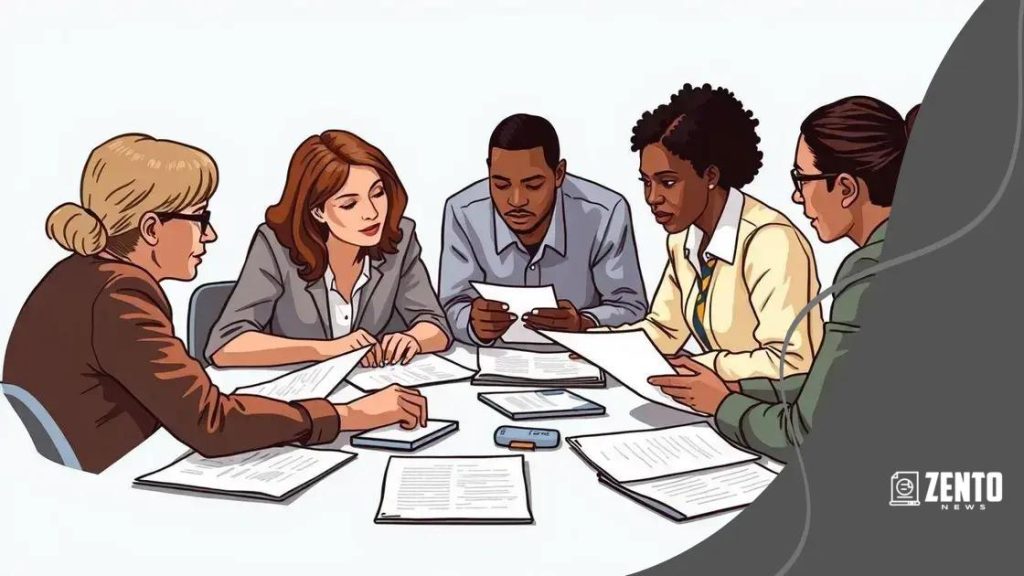Disability claim steps eased: Your guide to a smoother process

Anúncios
Understanding the steps for a disability claim involves knowing what documents to prepare, avoiding common mistakes, and following up on your application to improve your chances of approval.
Disability claim steps eased can significantly change the way you approach your application. Have you ever felt overwhelmed by the process? Here, we’ll break it down into manageable steps that make it easier to navigate.
Anúncios
Understanding the disability claim process
Understanding the disability claim process is crucial for anyone seeking benefits. It can often feel overwhelming, but breaking it down into steps can help.
The first step is knowing how to initiate the claim. This involves gathering necessary information, including your medical history and work records. It’s important to keep everything organized to avoid delays.
Key Steps in the Claim Process
Next, you’ll need to fill out various forms accurately. Make sure you provide detailed information about your disability, as this can make a big difference.
Anúncios
- Complete your application forms thoroughly.
- Submit supporting medical evidence.
- Be honest and clear about your daily limitations.
After submission, patience is essential. The review process can take time, so try to stay informed. If your claim is denied, you still have options. You can appeal the decision by providing additional evidence or clarification.
Common Challenges
Many face issues during the process. For example, incomplete documentation is a frequent reason for initial denials. If you don’t provide all required documents, it could lead to delays. Ensure that you keep copies of everything you send to the agency.
- Missing medical records.
- Inaccurate information on forms.
- Not following up on your application status.
By understanding and navigating the disability claim process carefully, you can enhance your chances for approval. Remember, this process can take time, but thorough preparation is key to success.
Key documents needed for your claim
When preparing to file a disability claim, knowing the key documents needed is essential for a smooth process. Gathering these documents ahead of time can save you valuable time and avoid potential delays.
First, you should collect your medical records. This includes detailed notes from your healthcare providers, your diagnosis, and treatment history. Having comprehensive medical documentation is critical, as it supports your claim.
Essential Documents to Gather
- Your Social Security number or a copy of your birth certificate.
- Complete medical records and reports from all healthcare providers.
- Work history, including pay stubs or W-2 forms.
- Notes from your doctor explaining how your condition affects your daily life.
In addition to medical documents, you may need to provide information about your work history. This includes details about your job roles, responsibilities, and earnings. These documents help establish how your disability impacts your ability to work.
Once you have these key documents, organize them in a folder. This will make it easier to find and submit them when you complete your claim. Also, consider having copies ready to send, as some agencies may request additional information after the initial submission.
Tips for Collecting Your Documents
Be proactive in collecting your documents. Start early to ensure you have everything you need. Don’t hesitate to reach out to your healthcare providers for any missing information, as they can help you obtain the necessary paperwork.
- Request copies of medical records well in advance.
- Keep a checklist of all documents gathered.
- Contact your previous employers for work-related forms.
The more organized you are, the easier the claim process will be. Always check if there are additional documents required by the specific agency you are applying to, as these can vary.
How to improve your chances of approval

Knowing how to improve your chances of approval for your disability claim is vital. Many applicants face denial due to minor issues that can be easily fixed.
First, ensure your application is complete and accurate. This means reviewing every section thoroughly. Any mistakes or missing information can lead to delays or denials. Always double-check your forms before submitting them.
Essential Tips for a Stronger Application
Providing comprehensive medical documentation is crucial. Detailed reports from your doctor about your condition support your claims and can significantly influence the decision.
- Ask your doctor for a detailed evaluation.
- Include information on how your disability affects daily activities.
- Submit any lab results or imaging that support your case.
It’s also beneficial to outline how your disability limits your ability to work. Be specific about your symptoms and how they impact tasks that are crucial for your job. The more information you provide, the better.
Follow Up and Stay Engaged
After filing your claim, don’t forget to follow up. This shows that you are serious about your application and are willing to provide any further information if needed. You can contact the disability office to check the status of your claim.
- Keep records of all communications.
- Be proactive in providing any additional requested information.
- Maintain patience during the review process.
If your claim is denied, don’t be discouraged. Many claims are successfully approved during the appeals process. Consider seeking help from a disability advocate who knows the system well and can assist you in strengthening your case.
Common mistakes to avoid when applying
When applying for disability benefits, it’s crucial to be aware of common mistakes that might hinder your chances of approval. Understanding these errors can help you present a stronger application.
One of the most frequent mistakes is incomplete forms. Failing to fill out all sections can result in delays or even denials. Each question is important, so take your time to answer carefully and completely.
Key Mistakes to Watch Out For
Another mistake is not providing sufficient medical evidence. Your claim requires comprehensive documentation from healthcare professionals that outline your condition.
- Neglecting to include recent medical reports.
- Failing to obtain specific notes from your doctors.
- Not mentioning all your diagnosed conditions.
It’s also vital to avoid exaggerating your limitations. Be honest about how your disability affects you daily. Providing inaccurate information can lead to distrust and complications in the review process. Always describe your symptoms clearly and accurately.
Understanding the Process
Some applicants forget to follow up after submitting their claims. Keeping track of your application status is essential. If additional information is requested, respond promptly to avoid delays.
- Do not ignore communication from the disability office.
- Keep records of all your correspondence.
- Make note of deadlines for submitting requested documents.
Lastly, don’t skip the appeals process if your claim is denied. Many people achieve success during the appeal phase. Ensure you’re aware of the steps and gather any extra documentation needed to support your case.
Next steps after submitting your claim
After submitting your claim, knowing the next steps is essential for ensuring a smooth process. While you await a decision, there are important actions to take and things to keep in mind.
First, it’s crucial to keep records of everything. Track all correspondence related to your claim, including submission dates, any requests for additional information, and communication with disability offices. This close monitoring can help you stay organized.
Follow Up on Your Claim
Don’t hesitate to follow up. Many applicants feel unsure about when to check in, but it is okay to reach out after a few weeks. Inquire about the status of your claim and be ready to provide any further documentation if needed.
- Prepare a list of questions before you call.
- Be polite but assertive when speaking with representatives.
- Take notes during the conversation for future reference.
As you wait for a decision, ensure your contact information is up to date with the disability office. If they cannot reach you, it can create delays. Respond quickly to any requests they send your way.
Receiving the Decision
Once the decision is made, you will receive a letter detailing whether your claim is approved or denied. If your claim is approved, follow the instructions provided to start receiving your benefits. If denied, don’t panic. Understand the reason for the denial, as this information can guide your next steps.
- Review the denial letter carefully.
- Consider collecting additional documents that might strengthen your case.
- Know the deadline for filing an appeal if you choose to do so.
Always remember that many claims are successful on appeal. Be persistent and prepared to present additional evidence that can support your case. The most important thing is not to give up.
In conclusion, navigating the disability claim process can feel overwhelming, but understanding the steps involved helps ease the journey. By following the outlined tips and knowing what common mistakes to avoid, you can significantly improve your chances of approval. Remember to keep records, be thorough with your documentation, and remain engaged throughout the process. Don’t hesitate to seek support if necessary, as persistence often leads to positive outcomes.
FAQ – Common Questions About the Disability Claim Process
What should I do if my disability claim is denied?
If your claim is denied, review the denial letter carefully, understand the reason for the denial, and consider gathering additional evidence to support your case for an appeal.
How long does it typically take to process a disability claim?
The processing time for a disability claim can vary. Generally, it takes about 3 to 5 months, but it may take longer depending on the complexity of your case.
What documents do I need to submit with my disability claim?
You will need to submit medical records, employment history, and any documentation that supports your claims about how your disability affects your daily life.
Is it necessary to hire a lawyer for a disability claim?
While it’s not required to hire a lawyer, having legal assistance can be beneficial, especially if you need to appeal a denial or if your case is complex.





